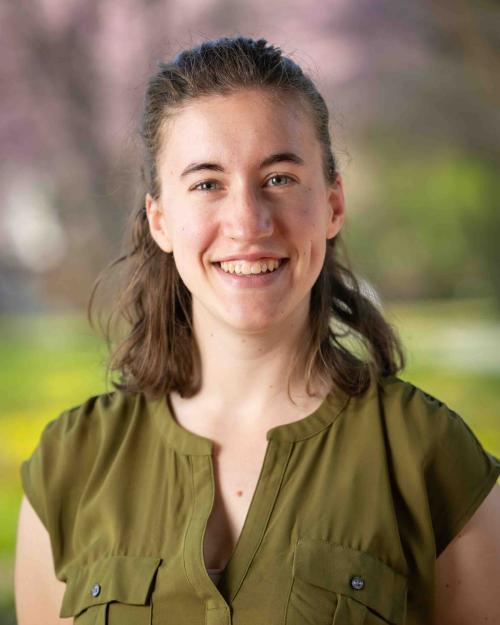McKenna Norton
Asian Studies & Robert S. Harrison College Scholar
Kennett Square, Pa.
What was your favorite class and why?
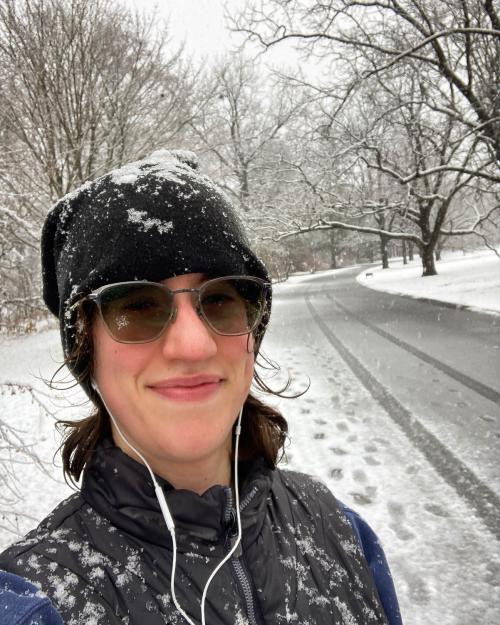
So hard to choose, but RELST 2273: Religion and Ecological Sustainability stands out to me. I learned to think about the world around me in a new way, and met so many incredible people as well. One of my favorite memories from that course was visiting Greensprings Natural Cemetery, which was the culmination of a few weeks of discussions about different religious traditions' ecological traditions around death. Visiting the cemetery was both a somber experience and, strangely, fun; seeing the cemetery, talking with friends during the car ride there and back, soaking in the landscape and getting to ponder the things I'd learned in the classroom was one of my favorite memories from that class.
Another favorite was the PE class PE 1651: Introduction to Outdoor Rock Climbing. Through that class, I had the opportunity to go rock climbing in the stunning Shawangunk Mountains. I had a fantastic time camping, climbing and getting to know the others on the trip, plus the experience sparked my passion for rock climbing. I also took PE 1670: Adirondack Canoe Camping, where despite pouring rain and cold temperatures I had a blast seeing the Adirondacks.
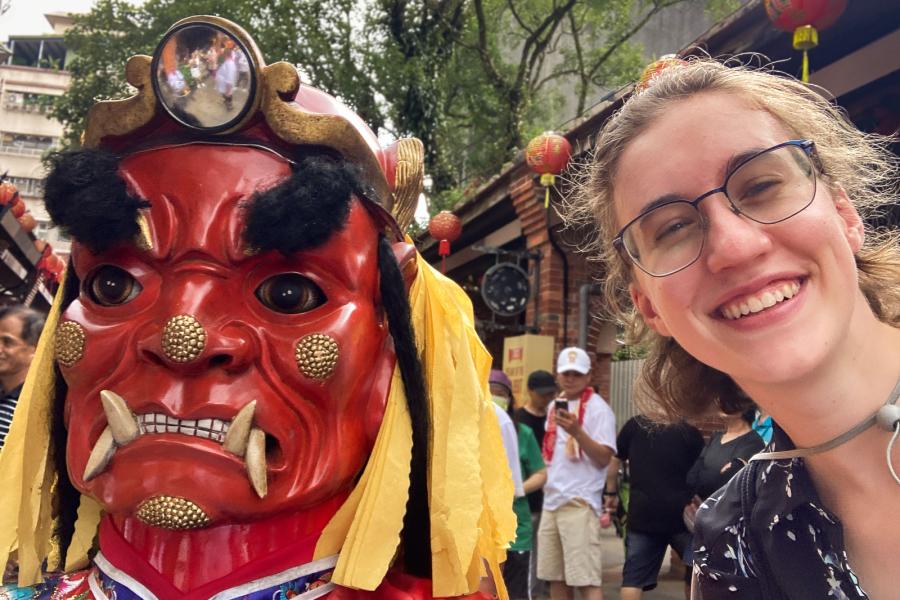
What Cornell memory do you treasure the most?
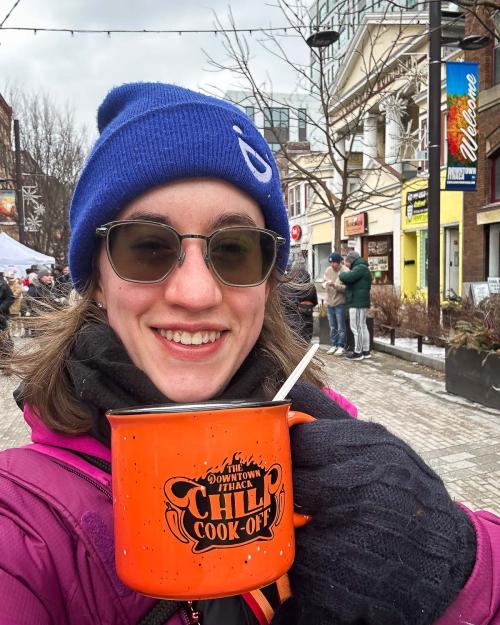
It's impossible to pick just one, but I frequently return to memories of a summer I spent in Ithaca through the Nexus Scholars program, where under the guidance of Professor Jane-Marie Law I taught classes about sustainability to local community members and conducted independent research on social alienation (essentially, the experience of being isolated from community). That summer was spent mostly outside learning how to compost, feeding chickens, picking berries, planting vegetables, running and swimming. Learning to engage with the environment around me, falling in love with Ithaca and studying community-building both in my teaching and independent research was life-changing. Those few months sparked much of how I've grown to today.
Also, I was able to spend the summer prior to my senior year in Taipei, Taiwan, as part of the inaugural Cornell-National Taiwan University Chinese Language Summer Program. This nine-week intensive Chinese language study at NTU’s International Chinese Language Program was an incredible experience, shared with six other students from Cornell; in addition to improving our Mandarin skills, we also were able to explore the city together – attending Chinese opera performances, riding bikes through the streets, visiting museums and cultural landmarks, and feasting on delicacies at the vibrant night-markets. The highlight of our trip was a three day trip to Xiaoliuqiu (Lambai Island), located on the southwest coast of Taiwan, that we independently planned and traveled to by high speed train, Uber and ferry; we hiked, kayaked and snorkeled alongside giant sea turtles.
What have you accomplished as a Cornell student that you are most proud of?
I'm really proud of my growth in the Asian studies department, both in terms of my theoretical capabilities and my language skills. I entered Cornell mostly uninterested in pursuing China studies but truly discovered a passion for it. I gained theoretical skills across comparative literature, religious studies, environmental humanities, gender studies and more, and I honed my language skills, passing Cornell's highest level of Mandarin courses and undertaking further language study beyond that level. It's so gratifying to know that the projects I'm working on now, whether my honors thesis research or my language studies, would have been unimaginable to pre-Cornell me. My honors thesis, for example, is not only profoundly interdisciplinary but has required three languages of primary source texts (Mandarin, English and Spanish) plus theoretical concepts from a variety of fields, and it truly has been shaped by theoretical concepts from, skills gained in, conversations had during, or ideas sparked by nearly every class I've taken at Cornell. Besides that, seeing my progress in Mandarin has made me proud; being able to read books written for native speakers, for example, is something that felt impossible coming into Cornell but now feels normal.
I've been a part of a variety of research projects, fellowship programs and study abroad programs. Some of my favorites have been the College Scholar Program, the Rawlings Program and spending time in Taiwan. Through the College Scholar and Rawlings Program, I've gotten to do research mentored by professors, plus write an interdisciplinary honors thesis. Doing independent research with professors, including Professors Law, Gubbins, Zurn and Admussen, has been so gratifying and challenging.
On campus, I've held a variety of jobs, including two years tutoring Mandarin language, where I got to share what I've learnt throughout my decade learning Mandarin with students of all levels, and I spent three years working with Dr. Alexis Shimon in the Cornell East Asia Series, an imprint of Cornell University Press, where I learned about the scholarly publishing process and got to see my work have a real-world impact when books I helped with were published. I never could have imagined playing a role in books being published, but throughout my time at the Press it's been so gratifying to see projects I've worked on come to fruition; moving from seeing book manuscripts on my computer to holding a published book in my hand is an experience I never expected to have in college but something I'm proud of working on.
I also spent two summers in Taiwan, where I got the opportunity to live in a monastery for a few weeks, plus take Mandarin language classes. That was an incredible experience and I can't wait to be back in Taiwan. My summers in Taiwan were monumental in terms of changing my relationship to the topics I study -- religion and literature -- plus the opportunity to get to know Taiwanese culture and people in a new way has profoundly shaped my academic and personal life. Spending time in the monastery is also something I'm quite proud of; learning how to engage with an environment completely unfamiliar to me in Mandarin was challenging but very worth it.
As one last note, I'm also very proud of my leadership in the Gender Justice Advocacy Coalition. Throughout the three years I've been involved in the organization, I've gained valuable leadership experience and have overcome challenges I couldn't have imagined pre-Cornell. To give a few examples, I spearheaded an initiative to expand our executive board and recover organizationally post-COVID, worked to make GJAC's funding more accessible to student clubs, and expanded outreach to the campus community when GJAC's funding was threatened.
Ultimately, I'm proud of my growth as a student, a leader and a person in general throughout my time at Cornell.
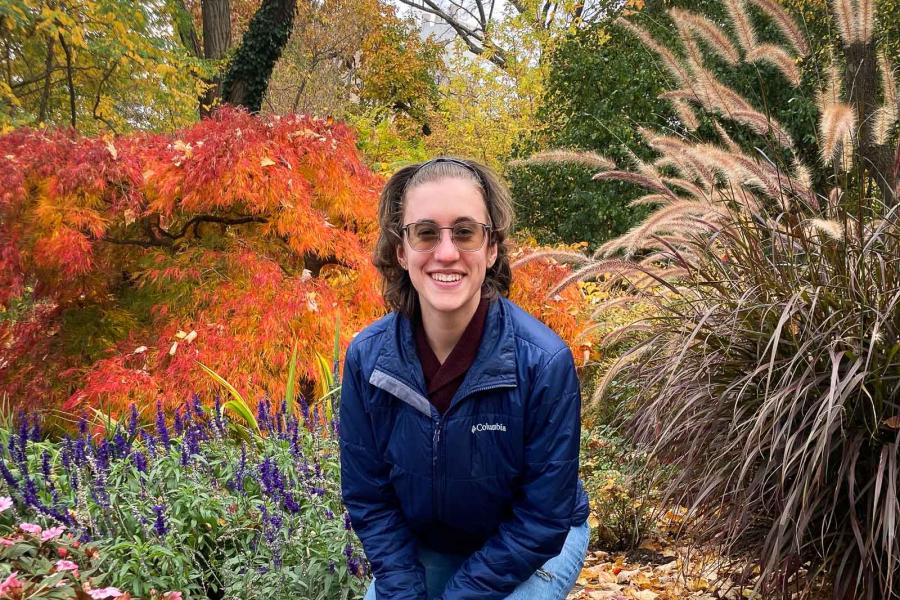
What are your plans for next year?
For the next two years, I'll be in Beijing studying for a Master of Arts in Chinese philosophy and religion through Peking University's Yenching Academy scholarship program! I'll specifically be studying Chinese Buddhism, Daoism, and folk religions' pilgrimage sites. I'm especially excited to improve my language abilities and do fieldwork with China's religious pilgrims, plus get to know China in a new way.
Every year, our faculty nominate graduating Arts & Sciences students to be featured as part of our Extraordinary Journeys series.Read more about the Class of 2025.




